
Kohlrabi, also called German turnip or turnip cabbage, is a biennial vegetable, a low, stout cultivar of wild cabbage. It is a cultivar of the same species as cabbage, broccoli, cauliflower, kale, Brussels sprouts, collard greens, Savoy cabbage, and gai lan.

The potato is a starchy root vegetable native to the Americas that is consumed as a staple food in many parts of the world. Potatoes are tubers of the plant Solanum tuberosum, a perennial in the nightshade family Solanaceae.

The sweet potato is a dicotyledonous plant that belongs to the bindweed or morning glory family, Convolvulaceae. Its large, starchy, sweet-tasting tuberous roots are used as a root vegetable. The young shoots and leaves are sometimes eaten as greens. Cultivars of the sweet potato have been bred to bear tubers with flesh and skin of various colors. Sweet potato is only distantly related to the common potato, both being in the order Solanales. Although darker sweet potatoes are often referred to as "yams" in parts of North America, the species is even more distant from the true yams, which are monocots in the order Dioscoreales.

A plum is a fruit of some species in Prunus subg. Prunus. Dried plums are most often called prunes, though in the United States they may be labeled as simply 'dried plums', especially during the 21st century.

The radish is a flowering plant in the mustard family, Brassicaceae. Its large taproot is commonly used as a root vegetable, although the entire plant is edible and its leaves are sometimes used as a leaf vegetable. Originally domesticated in Asia prior to Roman times, radishes are now grown and consumed throughout the world. The radish is sometimes considered to form a species complex with the wild radish, and instead given the trinomial name Raphanus raphanistrum subsp. sativus.

A melon is any of various plants of the family Cucurbitaceae with sweet, edible, and fleshy fruit. The word "melon" can refer to either the plant or specifically to the fruit. Botanically, a melon is a kind of berry, specifically a "pepo". The word melon derives from Latin melopepo, which is the latinization of the Greek μηλοπέπων (mēlopepōn), meaning "melon", itself a compound of μῆλον (mēlon), "apple", treefruit " and πέπων (pepōn), amongst others "a kind of gourd or melon". Many different cultivars have been produced, particularly of cantaloupes.

The boysenberry is a cross between the European raspberry, European blackberry, American dewberry, and loganberry.
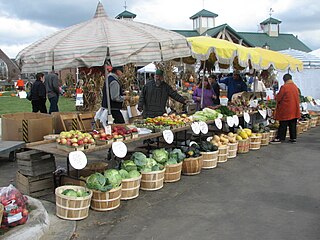
A farmers' market is a physical retail marketplace intended to sell foods directly by farmers to consumers. Farmers' markets may be indoors or outdoors and typically consist of booths, tables or stands where farmers sell their produce, live animals and plants, and sometimes prepared foods and beverages. Farmers' markets exist in many countries worldwide and reflect the local culture and economy. The size of the market may be just a few stalls or it may be as large as several city blocks. Due to their nature, they tend to be less rigidly regulated than retail produce shops.

Dryland farming and dry farming encompass specific agricultural techniques for the non-irrigated cultivation of crops. Dryland farming is associated with drylands, areas characterized by a cool wet season followed by a warm dry season. They are also associated with arid conditions, areas prone to drought and those having scarce water resources.

Yam is the common name for some plant species in the genus Dioscorea that form edible tubers.

Yukon Gold is a large cultivar of potato most distinctly characterized by its thin, smooth, eye-free skin and yellow-tinged flesh. This potato was developed in the 1960s by Garnet ("Gary") Johnston in Guelph, Ontario, Canada, with the help of Geoff Rowberry at the University of Guelph. The official cross bred strain was made in 1966 and 'Yukon Gold' was finally released into the market in 1980.
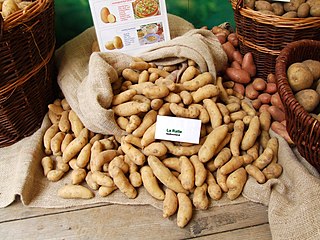
The Ratte potato is a small potato with a unique nutty flavor and smooth, buttery texture. The nutty flavour is said to have come from the types of soils the variety is grown in by the French farmers. This potato has an ovate shape, often with a slight curve and golden speckled skin. The flesh of this potato is a golden yellow and its texture maintains even when cooking.
The Vivaldi potato is a cultivar of potato bred by HZPC, in the Netherlands, and then passed to 'Naturally Best', based in Lincolnshire, England, who promoted and distributed the potato in the UK.
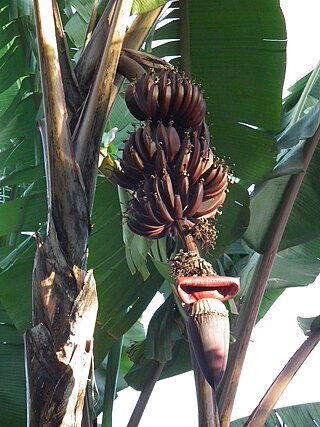
Red bananas are a group of varieties of bananas with reddish-purple skin. Some are smaller and plumper than the common Cavendish banana, others much larger. When ripe, raw red bananas have a flesh that is creamy to light pink. They are also softer and sweeter than the yellow Cavendish varieties, some with a slight tangy raspberry flavor and others with an earthy one. Many red bananas are exported by producers in East Africa, Asia, South America, and the United Arab Emirates. They are a favorite in Central America as a form of aphrodisiac juice, along with being a favourite in India to promote fertility but are sold throughout the world.
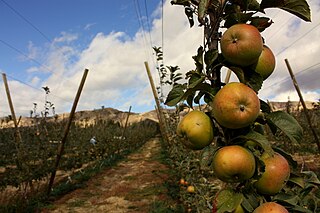
The Newtown Pippin, also known as Albemarle Pippin, is an American apple that originated in the late 17th or early 18th century and is still cultivated on a small scale. At one time, there were two very similar apple cultivars known as the 'Yellow Newtown' and 'Green Newtown', one of which perhaps originated as a sport of the other.

Watermelon is a flowering plant species of the Cucurbitaceae family and the name of its edible fruit. A scrambling and trailing vine-like plant, it is a highly cultivated fruit worldwide, with more than 1,000 varieties.
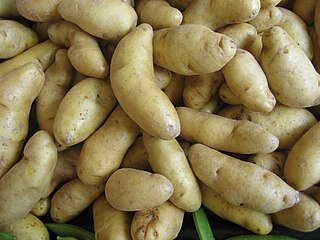
A fingerling potato is a small, stubby, finger-shaped type of potato which may be any heritage potato cultivars. Fingerlings are varieties that naturally grow small and narrow. They are fully mature when harvested and are not to be confused with new potatoes. Popular fingerling potatoes include the yellow-skinned Russian Banana, the pink-skinned, yellow fleshed French Fingerling, the Purple Peruvian, and the Swedish Peanut Fingerling. Due to their size and greater expense compared to other potatoes, fingerlings are commonly either halved and roasted as a side dish or used in salads.
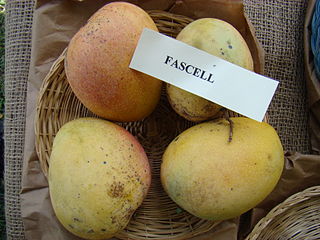
The 'Fascell' mango is a named commercial mango cultivar that originated in south Florida.
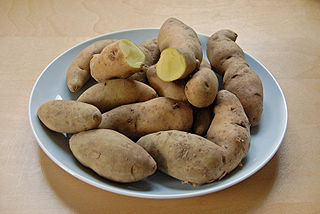
The Bamberg potato is an old potato variety from Franconia. It takes its name from the town of Bamberg.


















